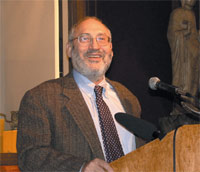 |
 |
 |
 |
|
AROUND THE QUADS
Professor Joseph E. Stiglitz, who joined the Columbia faculty in July from Stanford, has been awarded the Nobel Prize in Economics. Stiglitz is the fifth Columbia faculty member, and the third member of the economics department, to win the award in the past six years. The Royal Swedish Academy of Sciences honored Stiglitz, along with George Akerlof of California and A. Michael Spence P'04 of Stanford, for their "analyses of markets with asymmetric information." Stiglitz is the former chief economist at the World Bank and has appointments at the School of International and Public Affairs, the Graduate School of Arts and Sciences and the Business School. His work is considered the broadest among the three winners, whose findings explain, among other things, why consumers view warranties as signals of product quality, why insurance companies vary premiums and offer deductibles, and why a used car sells even though it is a lemon. Their theories incorporated "imperfect information" into economics — a concept at odds with the mainstream view that markets are all-knowing and self-correcting. The academy noted that Stiglitz "clarified the opposite type of market adjustment, where poorly informed agents extract information from the better informed, such as the screening performed by insurance companies dividing customers into risk classes by offering a menu of contracts where higher deductibles can be exchanged for significantly lower premiums. In a number of contributions about different markets, Stiglitz has shown that asymmetric information can provide the key to understanding many observed market phenomena, including unemployment and credit rationing." Stiglitz noted that "economics can make a difference" in improving people's lives by "focusing on the difference between the haves and have-nots. … Our global system is characterized by a lot of inequities," he added. "One part of the market knows more than another, and in a sense imperfect or asymmetric information is at the heart of our work." Stiglitz became a tenured professor at Yale at the age of 27 and has been on the faculty of Princeton and Oxford as well as Stanford. At 29, he became a fellow of the Econometric Society, and he is a member of the National Academy of Science. He also is the recipient of the prestigious John Bates Clark Medal, awarded every two years to the American economist under the age of 40 who has made the most significant contributions to the subject. Stiglitz has been influential in the making and evaluation of economic policy in the last decade, serving on President Clinton's Council of Economic Advisers, first as a member and later as chairman with cabinet rank, before becoming chief economist of the World Bank. Overall, 63 individuals who have taught or studied at Columbia have won the Nobel Prize since it was first awarded in 1901, including 21 current or former faculty members who won the prize for work done while at Columbia. The late William S. Vickrey was awarded the Nobel Prize in Economics in 1996 and Robert Mundell received the prize three years later.
|
|
||||||||||||||||||||||||||||||||||||||||||||||||||||||||||||||||||||
